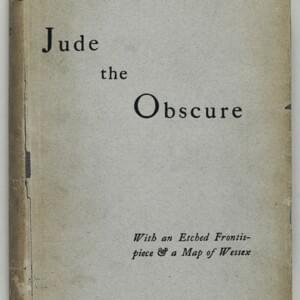
Jude the Obscure (Chap. 1.7) Thomas Hardy
На этой странице вы найдете полный текст песни "Jude the Obscure (Chap. 1.7)" от Thomas Hardy. Lyrxo предлагает вам самый полный и точный текст этой композиции без лишних отвлекающих факторов. Узнайте все куплеты и припев, чтобы лучше понять любимую песню и насладиться ею в полной мере. Идеально для фанатов и всех, кто ценит качественную музыку.

The next day Jude Fawley was pausing in his bedroom with the sloping ceiling, looking at the books on the table, and then at the black mark on the plaster above them, made by the smoke of his lamp in past months.
It was Sunday afternoon, four-and-twenty hours after his meeting with Arabella Donn. During the whole bygone week he had been resolving to set this afternoon apart for a special purpose,—the re-reading of his Greek Testament—his new one, with better type than his old copy, following Griesbach's text as amended by numerous correctors, and with variorum readings in the margin. He was proud of the book, having obtained it by boldly writing to its London publisher, a thing he had never done before.
He had anticipated much pleasure in this afternoon's reading, under the quiet roof of his great-aunt's house as formerly, where he now slept only two nights a week. But a new thing, a great hitch, had happened yesterday in the gliding and noiseless current of his life, and he felt as a snake must feel who has sloughed off its winter skin, and cannot understand the brightness and sensitiveness of its new one.
He would not go out to meet her, after all. He sat down, opened the book, and with his elbows firmly planted on the table, and his hands to his temples, began at the beginning:
Η ΚΑΙΝΗ ΔΙΑΘΗΚΗ.
Had he promised to call for her? Surely he had! She would wait indoors, poor girl, and waste all her afternoon on account of him. There was a something in her, too, which was very winning, apart from promises. He ought not to break faith with her. Even though he had only Sundays and week-day evenings for reading he could afford one afternoon, seeing that other young men afforded so many. After to-day he would never probably see her again. Indeed, it would be impossible, considering what his plans were.
In short, as if materially, a compelling arm of extraordinary muscular power seized hold of him—something which had nothing in common with the spirits and influences that had moved him hitherto. This seemed to care little for his reason and his will, nothing for his so-called elevated intentions, and moved him along, as a violent schoolmaster a schoolboy he has seized by the collar, in a direction which tended towards the embrace of a woman for whom he had no respect, and whose life had nothing in common with his own except locality.
Η ΚΑΙΝΗ ΔΙΑΘΗΚΗ was no more heeded, and the predestinate Jude sprang up and across the room. Foreseeing such an event he had already arrayed himself in his best clothes. In three minutes he was out of the house and descending by the path across the wide vacant hollow of corn-ground which lay between the village and the isolated house of Arabella in the dip beyond the upland.
As he walked he looked at his watch. He could be back in two hours, easily, and a good long time would still remain to him for reading after tea.
Passing the few unhealthy fir-trees and cottage where the path joined the highway he hastened along, and struck away to the left, descending the steep side of the country to the west of the Brown House. Here at the base of the chalk formation he neared the brook that oozed from it, and followed the stream till he reached her dwelling. A smell of piggeries came from the back, and the grunting of the originators of that smell. He entered the garden, and knocked at the door with the knob of his stick.
Somebody had seen him through the window, for a male voice on the inside said:
"Arabella! Here's your young man come coorting! Mizzle, my girl!"
Комментарии (0)
Минимальная длина комментария — 50 символов.












